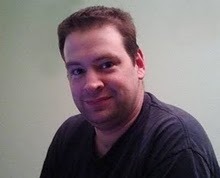Behind The Scenes With: Time-Travel Author Z. D. Robinson
 Time-travel is a fascinating subject for books and movies, but very hard to write about without leaving huge holes and questions in the minds of fans. Lucky for us, Z. D. Robinson handles this with a very capable hand. He recently sat down with me to answer some questions about his debut novel, The Great Altruist.
Time-travel is a fascinating subject for books and movies, but very hard to write about without leaving huge holes and questions in the minds of fans. Lucky for us, Z. D. Robinson handles this with a very capable hand. He recently sat down with me to answer some questions about his debut novel, The Great Altruist.
Q. First of all, tell us a little about your debut novel The Great Altruist.
A. The Great Altruist is the story about a woman called Genesis who was created to be the perfect soldier but became a nine-inch time-traveler instead. She travels through time, using her strengths to help people fix mistakes from their past. Along the way, she falls in love and desires to live a normal life. Little does she know that her creator designed her to return to the size of a normal woman as soon as she fell in love. But this all happens at a terrible time. Just as she loses her powers, a secret society is attempting to use time-travel to steal a weapon from the future and destroy all life on earth.
Q. Time-travel is a tricky subject, but the reviews I have read compliment you on the fact that there are no holes in your story that are common for similar storylines. How did you pull it off?
A. By reading it over and over and over and over again. It's funny, because the last time I read it was after a six-week break. I'd forgotten so much of the story by then that I would catch little plot holes and say, "I'll have to fix that." But a few pages later, I realized I already plugged the holes!
But time-travel has always been a favorite subject for me. I grew up watching Back to the Future and The Terminator. I always liked the little changes in Back to the Future that the writers were quick to catch. How like when Marty takes out a pine tree and the name of the mall changes from Twin Pines Mall to Lone Pine Mall. I think catching little stuff like that trained me to be diligent with my own work.
Q. You classify this as an epic adventure. How did you get started writing in this genre, and do you have aspirations of writing in others?
A. Actually, the original draft was a lot less epic. It's now designated Part II in the finished book. It's about a young man called James who goes back in time to win back his dream girl but ends up trying to save his parent's marriage. The story has been trimmed to fit the larger narrative now, but in the early draft, the story was very personal. It didn't have a lot of action; most of it was dialogue between James and Genesis.
It was only after I finished the story and came up with an interesting backstory for Genesis did I write another adventure – this one much more epic. To complete the story arc and tell of Genesis's first attempt at helping someone, I then wrote what is now Part I. It focuses on the adventure of a 19 year-old Polish girl who has just been liberated from Ravensbruck and wants to go back in time and prevent World War II. It's far more epic because it covers a lot of historical events in the life of Hitler, like Munich, Hitler's trial in Berlin, and the trenches of World War I. But it maintains the personal touch of the other stories. The final scene is between Hitler and his mother on the night of her death, for example.
As for future work, I'm reluctant to discuss too much in detail. But the next book I'll be releasing is far more epic and grand than anything I've done so far. I've designed a language for the world and a complete culture for my characters to exist in. It's not a direct sequel to The Great Altruist, but it does follow the events of the first book – just three thousand years later. After that, I return to my other roots with a book in the style of Groundhog's Day which will be a lot of fun.
Q. You're a fellow indie author. Can you tell us more about your decision to self-publish? What has been your experience so far?
A. I decided to self-publish because I'm very sensitive to rejection. I wrote only one query letter but never sent it. Besides, I'm too much of a control-freak to let someone else remove parts of my work just because they think it won't be marketable. With the self-publishing model, the author is calling the shots – good, bad, and potentially very ugly. Fortunately, the reviews so far have been overwhelmingly positive!
Q. Do your friends and family read your work? What do they think, and are they supportive?
A. Many of my friends and family have read my book. They're incredibly supportive, but I'm sure that would change if I decided to quit my day job just yet. My wife is the most supportive. She reads all my work first, and I trust what she says. If she doesn't like something, it usually goes. If it makes her cry, it stays forever.
Q. What kind of reaction have you gotten from your readers?
A. It's kind of an insult, but a lot of my readers are shocked by how professional my work is. I think, "Well, what the heck do you think I'm doing?!" But that's a good thing too. To be an amateur and told my writing is good is very encouraging.
Q. Who are your favorite authors, and have they influenced your work?
A. Growing up, I loved Michael Crichton and J. R. R. Tolkien. I also like Orson Scott Card, but that's more because he's a good example of what not to do – at least when it comes to dialogue.
Q. Real books or e-reader?
A. I definitely prefer real books, but since I have three small children it's hard to keep book on shelves and in good order. The Kindle has just been awesome for me.
Q. Okay, now give me the deets on the real Z. D. Robinson… You're a software developer – what does that entail and do you like your day job?
A. I work in the Data Conversions department of a software company, and I spend my days converting databases. It isn't exciting work; in fact, it's kinda dull. But the job means I spend hours a day waiting for code to run. That's a good thing because I keep a Word document open and peck away at my stories. A lot of guys in my position might watch movies or play on the Internet instead, but I try to stay productive.
Q. Where do you live?
A. I'm originally from New Jersey. I moved to the Midwest a week before 9/11 and I've stayed here ever since.Missouriis where I met my wife and her family is close, which is important to both of us now that we have kids.
Q. Tell me something random that no one knows about you.
A. There's very little people don't know about me because I have a big mouth and readily talk about myself – even when I'm not asked to!
But one of those weird quirks that most people don't know (and it's something that doesn't readily come up in conversation) is that I have an aversion to all verbs that begin with 'sq.' How's that for random? [Laughs]
Q. You compare your novel to the movie Back to the Future. Are you more like Marty McFly or Doc Brown?
A. Definitely Doc Brown. I'm sure people have told my friends not to hang out with me because I'm weird or a nut-job.
Q. Where and when do you write? Is it hard to find time to write? Your preference – music blaring, or absolute quiet?
A. I don't get to write at home much because the little guys keep my occupied. And after they go to bed, I make time for my wife. So the only chance I get to do some really serious writing is during my lunch breaks at work. I blare music through my headphones all day anyway, and that doesn't change when I write. The type of music I listen to varies a little. For example, when I'm writing a very emotional scene, I prefer movie soundtracks. Other than that, Bruce Springsteen is almost always playing – although that's true even when I'm not writing. In fact, if there is one artist that has influenced me the most creatively, it's Springsteen. I already have a book planned where his music figures prominently.
Q. Pen and paper or keyboard?
A. Both. I always keep a small notebook in my backpack that I use to jot down notes or blueprint scenes and plot. I sometimes write entire chapters by hand and then type them up in Word. It's more laborious that way, but it allows me to write whenever the mood strikes me.
Q. Do you create your own cover art?
A. Yes I do. I don't think I'm a great artist by any stretch. But I don't have a lot of discretionary cash and that limits what I can afford to have done for me. Some authors don't like that approach, especially when it comes to the editing part, as they believe that no one can do all jobs equally. They're probably right to think that, but with my work it's not really a philosophical choice. It's just the way it is.
Q. At what age did you start writing? Did you always want to be a writer?
A. I wrote a lot of short stories in high school. Most of them were about lone ninjas scaling towers to face an evil lord (my early work was inspired by Teenage Mutant Ninja Turtles, apparently) or about lone high school kids fighting off government agents. It was all total crap, and I'm glad none of it has survived.
Q. Do you have any advice for writers, young and old alike?
A. Focus on characters over plot. A good character will inform where the story goes. If you focus too much on plot and force characters to follow a preconceived ending, your readers will know and dislike you for it.
Q. What can we expect next from Z. D. Robinson?
A. My next book is called The Law and the Devoted. It follows the events of The Great Altruist three thousand years later. After that is Revolve, a story about a man who wishes the world revolved around him and wakes up one morning to find that it does.
 Thanks Z. D. for taking the time to share with us! For more information on Z. D. Robinson, follow him on Facebook, Twitter, or you can email him directly at zdrobinson4@gmail.com
. If you'd like to get a copy of The Great Altruist, you can find it at Amazon and Barnes & Noble.
Thanks Z. D. for taking the time to share with us! For more information on Z. D. Robinson, follow him on Facebook, Twitter, or you can email him directly at zdrobinson4@gmail.com
. If you'd like to get a copy of The Great Altruist, you can find it at Amazon and Barnes & Noble.











